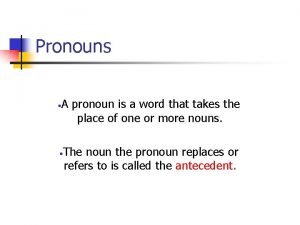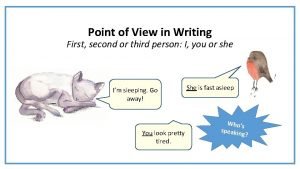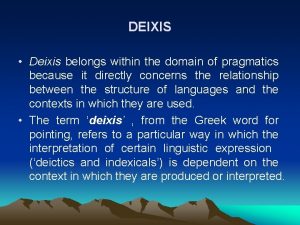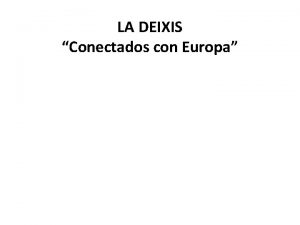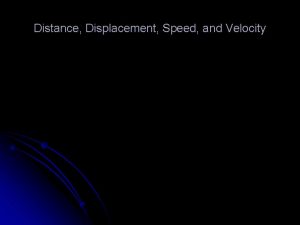DEIXIS AND DISTANCE 2 1 Person Deixis 2












- Slides: 12

DEIXIS AND DISTANCE 2. 1 Person Deixis 2. 2 Spatial Deixis 2. 3 Temporal Deixis 2. 4 Deixis and Grammar

INTRODUCTION Deixis (Greek): ‘ ’ via language = indexicals: any linguistic form used to accomplish this ‘pointing’ Deixis is tied to the speaker’s context with diectic expressions ‘ ’ proximal terms this here now ‘away from speaker’ that there then

Deixis temporal person to indicate people to indicate location

2. 1 PERSON DEIXIS It operates on a basic 3 -part division: First person - inclusive we: S + A - exclusive we: S + A + O I Second person : You Third person: she, it In many languages, person deixis is elaborated with markers of Honorifics: expressions which indicate higher status Person deixis = = include social status e. g T/V distinction In deitic terms, the 3 rd person is not a direct participant in basic (I-You) interaction, and being outsider = more distant

Using the 3 rd person form, where the 2 nd person form is possible is one way of - Communicating distance - an ironic or E. g. “Would his highness like some coffee? ” (one person is very busy in the kitchen, addresses another, who’s being lazy) - make E. g. “Somebody didn’t clean up after himself” (instead of saying “you didn’t clean up”) - make seem like impersonal one E. g. “Each person has to clean up after him or herself” (instead of saying “you didn’t clean up”) - state general ‘ ’ E. g. “We clean up after ourselves around here” (instead of saying “you didn’t clean up”)

2. 2. SPATIAL DEIXIS Concept of spatial deixis: - people’s location and things is being indicated e. g. here and there - Motion toward speaker e. g. come “come to bed!” go ”go to bed!” Deictic : speaker seems projects themselves into other locations - Project to other location prior to actually being in those locations. e. g. “I’ll come later” location. e. g. “I’m not here now” (recorder of a telephone answering machine) to represent the person, location, and feeling. e. g. “I was looking at this little puppy in a cage with such a sad look on its face. It was like “Oh, I’m so unhappy here, will you set me free? ””

: physically close objects will tend to be treated by the speaker as psychologically close. - physically distant objects will tend to be treated by the speaker as psychologically distant. E. g. “the man over there” - Mark something that physically close as psychologically distant E. g. “I don’t like that” (after sniffing a perfume)

2. 3 TEMPORAL DEIXIS ‘now’: the time coinciding with the speaker’s utterance and the time of the speaker’s voice being heard The distal expression “then” can be: Interpretation on knowing relevant utterance time -Past time e. g “November 22 n d , 1990? I was in Surabaya, then. ” - Future time e. g “Dinner at 8 on Saturday? Ok. I’ll see you then. ” time e. g “Back in hour. ” (we don’t know the time when it was put) “Free soft drink tomorrow. ” (1 day earlier)

Basic type of temporal deixis in English: the choice of tense: : Close to current situation Distant form: Distant from current situation Present tense e. g. I live here now e. g. I live there then Something is treated as extremely impossible from the current speaker’s situation = not close to present reality e. g. I could be in Hawaii (if I had a lot of money) If I had a yacht, …. If I was rich, ….

2. 4 DEIXIS AND GRAMMAR Grammar brings different interpretation Proximal deictic: e. g. are you planning to be here this evening? ( speech) Distal deictic: e. g. I asked her if she was planning to be there that evening. ( speech) The interpretation of deictic expression depends on: Context intention Express Dietic expressions always communicate more than is said

EXERCISE 1. To which deixis these signs belong to? Analyze them, and interpret their meanings.

2. Mention the deictic expressions in the following song lyric, classify them into proximal or distal deictic?
 1st person 2nd person 3rd person
1st person 2nd person 3rd person Deictic expressions
Deictic expressions Was ist 1. person plural
Was ist 1. person plural Person person = new person()
Person person = new person() Reflexive pronouns
Reflexive pronouns Pragmatics
Pragmatics A delivery truck travels 18 blocks north
A delivery truck travels 18 blocks north The ratio of input distance to output distance
The ratio of input distance to output distance Person-job fit and person-organization fit
Person-job fit and person-organization fit Person a and person b
Person a and person b Characteristics of academic writing slideshare
Characteristics of academic writing slideshare First person vs third person writing
First person vs third person writing Conflicts in fahrenheit 451
Conflicts in fahrenheit 451




